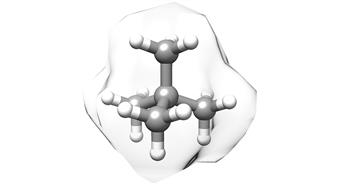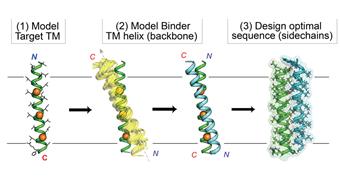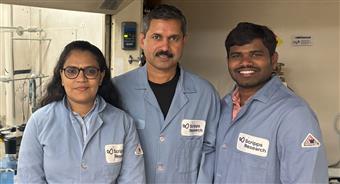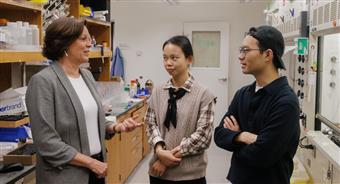
Scripps Research and Tempus collaborate to study how individual blood sugar levels vary The study will leverage genomics and digital technologies to better understand factors that contribute to obesity and type 2 diabetes.
February 04, 2021
LA JOLLA, CA Scripps Research, a globally recognized nonprofit biomedical research institute, today announced a collaborative research program with Tempus, a leader in precision medicine and artificial intelligence, to develop a predictive model of glucose responses in people with and without type 2 diabetes. By understanding individual changes in blood sugar levels, scientists aim to boost efforts to combat the twin epidemics of diabetes and obesity.
The program, called PRediction Of Glycemic RESponse Study (PROGRESS), will leverage data from participants' genomes and microbiomes, as well as information from digital technologies, to understand the many factors that dictate how individual blood sugar levels change in response to food.
There is growing evidence that glycemic responses to the same foods differ significantly from person to person, says Edward Ramos, PhD, director of Digital Clinical Trials at the Scripps Research Translational Institute and principal investigator of the study. Advances in individualized data collection through personal health tracking devices enable us to better quantify a wide range of personal traits that will assist in refining more personalized approaches for glycemic control.
Diabetes, which results in too much sugar in the blood, is one of the most prevalent and costly chronic diseases in the United States, with more than 100 million adults living with the disease or early signs of it. Obesity is a significant risk factor. At a population level, excessive eating or poor nutritional intake are known to lead to weight gain and an increased risk of diabetes. However, many questions remain about how these factors play into disease risk on an individual level.
Many factors contribute to the variability in glycemic responses, including chewing, saliva composition, digestion, genetics, body mass index, diet and gut microbiota. Developing a predictive model of individual glycemic response requires analyzing large amounts of biologic, physiologic, clinical and lifestyle information. Given the complexity of these factors and how they connect with one another, machine-learning tools are needed to process the broad array of data.
Despite recent advances in understanding the many genetic and environmental factors underlying diabetes, there have been few large-scale studies that fully address the complex, multi-modal nature of this disease, says Joel Dudley, PhD, Chief Scientific Officer, Tempus. This study aims to build a foundation of data and understanding that will enable development of intelligent precision medicine technologies to address unmet clinical needs in diabetes at scale. We're delighted to collaborate with Scripps Research to advance our understanding of diabetes and the pursuit of next-generation clinical trial design.
PROGRESS will adopt the site-less clinical trial model pioneered by scientists at the Scripps Research Translational Institute. Enabling remote participation through home delivery of biosample collection and digital health technology kits, as well as a study-specific mobile application for communication, the scientists aim to eliminate many of the barriers that exist for traditional clinic-based studies (e.g. access to clinics, time constraints, transportation challenges, limited participation).
Healthcare system partners will recruit 1,000 study participants over the age of 18. Half will consist of individuals with diagnosed type 2 diabetes and half without a diagnosis. The study will monitor participants' dietary intake, activity levels and continuous glucose values over 10 days, using that data along with genomic, microbiome and electronic health record data to develop algorithms for predicting glycemic response on an individual level. Study participants will also be passively monitored for changes in health outcomes over the course of three years.
The scientists hope this work will bolster personalized health management programs and help address the growing obesity and diabetes epidemics, both in the United States and globally.
Translational Institute Ramos, Edward
More from Scripps
12/04/2024
Scripps Research chemists devise easier new method for making a common type of building block for drugs Scientists transform simple linear amines into saturated...
06/04/2024
A simple, inexpensive way to make carbon atoms bind together A Scripps Research team uncovers a cost-effective method for producing quaternary carbon molecules,...
04/04/2024
Developing a vaccine for the zombie drug xylazine Scripps Research chemical biologists design an early proof-of-concept vaccine that could lead to the first...
30/03/2024
How blocking a neural receptor responsible for addiction could reduce alcohol use A Scripps Research team found that a new therapeutic that targets the kappa op...
13/03/2024
New computational strategy boosts the ability of drug designers to target proteins inside the membrane Customized-design approach could streamline the design of...
29/02/2024
Scripps Research scientists reveal how first cells could have formed on Earth New phospholipid discovery brings researchers closer to understanding how primordi...
29/02/2024
How molecular handedness emerged in early biology Scripps Research chemists fill a major gap in origin-of-life theories.
February 28, 2024
LA JOLLA, CA Mole...
22/02/2024
Snaking toward a universal antivenom Scripps Research scientists discovered antibodies that protect against a host of lethal snake venoms.
February 21, 2024
...
06/02/2024
Calibr-Skaggs announces expansion of option and license agreement with AbbVie to develop novel cell therapies for solid tumors and autoimmune diseases
AbbVie...
26/01/2024
Re-energizing mitochondria to treat Alzheimer's disease Scripps Research team restored neuron-to-neuron connections in human cells.
January 25, 2024
LA JO...
24/01/2024
100 years of Science Changing Life: Scripps Research celebrates a century of transforming human health For the last century, institute leaders and renowned scie...
23/01/2024
New technology lets researchers track brain cells' off switches The method could shed light on what goes awry in numerous brain conditions when neurons ar...
09/01/2024
Three decades of giving: Announcing the Calibr-Skaggs Institute for Innovative Medicines The ALSAM Foundation, founded by the Skaggs family, provides lasting g...
04/01/2024
Life science entrepreneur Gene Lay joins Scripps Research Board of Directors Lay, founder of the global biotech company BioLegend, brings invaluable experience ...
21/12/2023
Taming a plant-derived toxin Scripps Research team modifies the traditional poison picrotoxinin for potential neurological drugs and anti-parasite treatments. ...
19/12/2023
Scripps Research Executive Vice President Eric Topol gives TED talk on transformative power of AI in medicine Topol provides an overview of how AI models can i...
13/12/2023
New AI-powered algorithm could better assess people's risk of common heart condition Early detection of atrial fibrillation can reduce the risk of stroke an...
07/12/2023
Nanoparticle flu vaccine design shows promise in early tests Scripps Research-designed vaccine could provide broad, enduring protection against influenza A str...
16/11/2023
Numerous Scripps Research scientists named Highly Cited Researchers Clarivate's annual, global list represents researchers who have demonstrated significant...
07/11/2023
Multiple sclerosis drug invented at Scripps Research slows long-term devastating disease progression Late-breaking data reinforces the effectiveness and safety ...
05/10/2023
Keren Lasker named a 2023 Moore Inventor Fellow The prestigious award will support Lasker's inventive research in membraneless organelles and their applica...
22/09/2023
Michael Bollong named a 2023 Amgen Young Investigator The prestigious award will support Bollong's research identifying new molecular targets and therapeuti...
09/09/2023
Philip Dawson receives 2024 American Chemical Society National Award Dawson is honored with the Arthur C. Cope Late Careers Scholar Award for his foundational c...
07/09/2023
Scripps Research chemists devise a method for C-H activation of alcohols The method represents a new toolkit for making drugs and other compounds.
September 06...
31/08/2023
Scripps Research receives $1.5M to surveil infectious disease threats in wastewater Bill & Melinda Gates Foundation award to support the development of multi-pa...
16/08/2023
How cold temperatures trigger the brain to boost appetite Scripps Research scientists' discovery could lead to new weight loss and metabolic health treatmen...
08/08/2023
Human antibody that targets carfentanil, fentanyl and related opioids reverses overdose effects in preclinical study Scripps Research-developed antibody therapy...
04/08/2023
How sensory neurons impact the gut Scripps Research scientists show that the receptor PIEZO2 in sensory neurons controls gut motility and transit time, which a...
26/07/2023
AbbVie and Calibr Expand Strategic Collaboration to Advance Several Preclinical and Early-stage Clinical Assets The expanded strategic collaboration will advan...
23/07/2023
Scripps Research scientists develop AI-based tracking and early-warning system for viral pandemics Machine-learning system effectively predicts emergence of pro...
19/07/2023
Monitoring T cells may allow prevention of type 1 diabetes Scripps Research study shows that analyzing T cells in blood samples could be used to select at-risk ...
19/07/2023
Scripps Research mourns passing of leading organic chemist Albert Eschenmoser Eschenmoser pioneered key reactions in synthetic chemistry and shaped the understa...
15/06/2023
Scripps Research awarded $46.8 million by NIH to promote human health through innovative translational science and training The Translational Institute is harne...
13/06/2023
Scripps Research's Danielle Grotjahn named 2023 Pew Scholar in the Biomedical Sciences The award will support Grotjahn's study of how cells assemble the...
31/05/2023
Crossing the ring: new method enables C-H activation across saturated carbocycles Scripps Research chemists add another powerful tool to their molecular editin...
24/05/2023
Scripps Research develops behind-the-scenes tool for better biomedical data discovery The new resource makes datasets more discoverable for life science communi...
19/05/2023
Scripps Research neuroscientist Hollis Cline elected to American Academy of Arts and Sciences Cline is recognized for her discoveries about the role of sensory ...
19/05/2023
Scripps Research's Skaggs Graduate School awards doctoral degrees to 31st graduating class Commencement ceremony will be livestreamed via Zoom and on instit...
13/05/2023
A better route to benzocyclobutenes, sought-after building blocks for drugs Scripps Research chemists devise a new, C-H activation-based method for the synthesi...
09/05/2023
Renowned Scripps Research professor Jeffery Kelly elected to National Academy of Sciences Kelly's groundbreaking work on protein misfolding has led to thera...
28/04/2023
Mirror-image molecules pave new path for cancer drug discovery By comparing how mirror image versions of small molecules impact clusters of proteins, Scripps R...
22/04/2023
How alcohol consumption contributes to chronic pain A Scripps Research team showed how both alcohol intake and alcohol withdrawal can lead to increased pain and...
21/04/2023
Xin Jin receives dual awards to study autism risk genes in neurodevelopment Major grants from the National Institutes of Health and California Institute for Reg...
20/04/2023
Trim the sugar: New HIV vaccine design improves immune response Scripps Research vaccine candidate headed for clinical trials.
April 19, 2023
LA JOLLA, CA A...
18/04/2023
Therapeutic can seek and destroy potent opioid to treat overdoses Scripps Research chemists developed a new biologic to work against the synthetic opioid carfen...
07/03/2023
How heavy alcohol consumption increases brain inflammation The findings by a Scripps Research team point toward a potential new drug target for treating alcohol...
02/03/2023
Scientists find human antibodies that can block multiple coronaviruses including SARS-CoV-2 Results from a Scripps Research and UNC team pave the way for a vacc...
28/02/2023
$10 million grant funds Scripps Research Alcohol Research Center through its 50th year The five-year grant supports research into the neurobiology of alcohol us...
28/02/2023
Immune system drug shows promise in treating alcohol use disorder, a Scripps Research clinical trial reports Scientists at Scripps Research found that apremilas...
23/02/2023
Chemically poisoned protein acts as a molecular switch to spur cancer formation The discovery triggered development of a new potential drug to eliminate tumor...
 Scripps Research and Tempus collaborate to study how individual blood sugar levels vary The study will leverage genomics and digital technologies to better understand factors that contribute to obesity and type 2 diabetes.
Scripps Research and Tempus collaborate to study how individual blood sugar levels vary The study will leverage genomics and digital technologies to better understand factors that contribute to obesity and type 2 diabetes. 
























